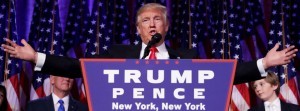The majority of American voters awoke on the morning of Nov. 9th — if they had even gone to sleep the night before — to find that their candidate for president, Hillary Rodham Clinton, had won the popular vote by a small margin but had lost the presidency because her rival, Donald J. Trump, had captured the majority of votes in the Electoral College, especially in such “Rust Belt” states as Ohio, Pennsylvania and Wisconsin.
They had to ask themselves how Trump, a misogynist, anti-Mexican and anti-Muslim candidate who had attracted support from the far right as well as from professed anti-Semites, could have won the election. While TV pundits and political scientists may be debating this question for years, one thing is clear: the majority of Americans who voted for Trump felt that the United States was moving in the wrong direction, and many white voters, as well as a surprising number of Latinos, felt that the economy was leaving them behind as the elites, primarily living in the large cities of the U.S., were getting richer while those living primarily in smaller cities and rural areas struggled economically — even if they had jobs — as their wages stagnated.
Trump was able to tap into this anti-elite sentiment, blaming globalization and trade agreements like the North American Free Trade Agreement for their predicament, and promising that he would turn things around and make America “great again.”
Clinton did not help her cause when she initially branded half of Trump supporters as “deplorables,” thus reinforcing their antipathy to the Washington elite which she was seen as representing.
Now that he has been elected, however, Trump faces a series of challenges, both foreign and domestic, that if he doesn’t meet might limit him to a one-term presidency.
Foreign Challenges
Trump’s rather bombastic statements during the election campaign have reinforced the challenges the U.S. was already facing in the world.
After boasting that he knew more about defeating ISIS than American generals did, Trump must now decide whether to continue the Obama policy of supporting local forces, as the U.S. is currently doing in Iraq and Syria, or to insert more U.S. troops into the battle to speed up the process of defeating ISIS; or to pull U.S. forces out and let Russia, together with Iran — both of whom Trump has said he sees as allies in the battle against ISIS — do the job.
If Trump were to make that choice, the end result would be to cede control of both Iraq and Syria to the Russian-Iranian alliance, a development that would antagonize U.S. allies in the Middle East such as Israel and Saudi Arabia.
In looking to the future of Russian-American relations, Trump has praised Russian President Vladimir Putin as a strong leader and has said he wants to see an improvement of Russian-American relations which had sharply deteriorated following the Russian annexation of the Crimea and intervention into eastern Ukraine.
Such a rapprochement, however, holds dangers for America’s allies in Eastern Europe who fear a Russian invasion, as had happened in Georgia in 2008 and Ukraine in 2014. This is especially the case in the Baltic country of Estonia, a NATO member, which Newt Gingrich, former speaker of the House of Representatives who is being considered for the post of secretary of state, has said the U.S. should not defend from Russia because Estonia was in the “suburbs” of the Russian city of St. Petersburg (actually, the Estonian border is more than 50 miles from St. Petersburg).
Compounding this problem are statements made by Trump on the campaign trail such as his call for a “Fortress America” — a statement that reeks of isolationism — and that he wouldn’t defend America’s NATO allies unless they spend at least 2 percent of their GNP on defense (ironically, Estonia meets this 2 percent standard). In general, Trump has deprecated the NATO alliance just at the time that the Obama Administration has been increasing military aid to the Baltic States and Poland while also forging closer military ties with Finland and Sweden to help them resist the growing threat from Moscow.
If Trump’s planned rapprochement with Putin gives the Russian leader the idea that he has carte blanche in Eastern Europe, that could well mean the demise of NATO, something that would be a major blow to U.S. security. Fortunately for NATO, a number of Republican leaders in Congress, as well as Vice President-elect Mike Pence, have a more jaundiced view of Russian policy than Trump, and this could have a positive effect on U.S.-NATO relations.
Another alarming statement by Trump on the campaign trail was his encouraging of South Korea and Japan to acquire nuclear weapons so they could defend themselves without U.S. help. Not only would such a development undermine the alliance structure which the U.S. has built in the Pacific to contain China and North Korea, it would also lead to nuclear proliferation and increase the danger of an outbreak of nuclear war.
As far as North Korea is concerned, a country which already has nuclear weapons and is developing long-range missiles that could threaten the U.S., all that Trump has said is that he would meet and make a deal with the mercurial North Korean leader Kim Jong Un. Whether Kim would sit down with Trump, let alone make a deal with him, is a very open question as hostility to the U.S. has been a staple of North Korean policy.
In the case of the 2015 nuclear agreement with Iran, Trump has made contradictory statements. On the one hand, he has called for “dismantling the agreement,” but on the other hand he has also said he would “police that contract so tough that they don’t have a chance [to develop a nuclear weapon].” The fact of the matter is if the U.S. tore up the agreement, that would not compel the other signatories such as France, which has just signed a multi-billion dollar deal to develop Iranian natural gas, to do so, and the U.S. would be isolated in its renewal of sanctions.
In addition, such a unilateral act by the U.S. would increase the chance for a military conflict between Iran and the U.S. While Saudi Arabia and Israel, enemies of Iran, might well welcome such a conflict, a war would badly damage the oil and natural gas fields of the Middle East, a development that would lead to a rapid escalation of the price of oil. However, If Trump adheres to his policy of cooperating with Iran against ISIS, the chances of a war between the U.S. and Iran could diminish.
Trump’s plan to dramatically raise tariffs on products coming from Mexico and China to create manufacturing jobs in the U.S. would not only have negative effects economically in this country (see below), it would have negative political effects as well.
In the case of China, it would exacerbate tensions already high because of China’s fortifying of islands in the South China Sea, and would push China, which has been improving relations with Russia in recent years, into an even closer alignment with Moscow.
In the case of Mexico, the rise in tariffs would damage the Mexican economy and, coupled with the border wall Trump has promised to build (although where he would get the funds to do so is an open question) , would add greatly to the instability in Mexico, already plagued by drug cartels. From the point of view of American security, the last thing the U.S. needs is a highly unstable country on its southern border.
Finally, in the case of Israel, some initial moves by the incoming Trump Administration may serve the interests of Israeli Prime Minister Binyamin Netanyahu and his Likud Party, but not the interests of Israel as a whole.
David Friedman, Trump’s adviser on Jewish affairs, told the Jerusalem Post after the election that not only would Israel have a friend in Trump such as the Jewish State “has never seen before,” but that Trump would fulfill his campaign pledge to move the U.S. Embassy in Israel from Tel Aviv to Jerusalem. He also hinted that it would be OK for Israel to ask for more than the $ 3.8 billion per year approved in the new U.S.-Israel military aid agreement, something currently prohibited by the agreement.
The advent of the Trump presidency has emboldened right-wing Israelis such as Jewish Home Party leader Naftali Bennett to assert that the U.S. would no longer call for a two-state solution for the Israeli-Palestinian conflict and would no longer oppose Israel’s building of settlements on the West Bank. If Bennett’s assertion proves correct, then Israel will be on the path, given the birthrate of Palestinians living on the West Bank as well as the Arab citizens of Israel, to a South Africa-like Apartheid situation where a minority of Jews would rule a majority of Arabs — something that many Israelis, let alone American Jews, strongly oppose.

Domestic Challenges
If Trump has a large number of foreign policy problems, his domestic challenges are no less daunting.
First, if he hopes to get reelected in 2020, is to create well-paying jobs for workers, especially those in Rust-Belt states who have become unemployed either because of globalization — the moving of their jobs to other countries where labor costs are lower — or by the technological progress that has replaced factory workers with robots.
Raising tariffs against China and Mexico is a self-defeating solution to this problem. Not only will it cause these countries to impose high tariffs on U.S. products, thus costing jobs in American export industries, but it would raise prices for U.S. consumers, leading to a spike in the inflation rate, already under pressure because of Trump’s plan to cut taxes by up to $ 7 trillion, and it might also cause a trade war.
A better strategy for Trump would be to convene a conference of U.S. business people who have moved their factories overseas, and ask them what kinds of incentives they would need to relocate their factories back to this country. Most likely, one of the things they would ask for is a highly-skilled labor force so they could produce high-value products that would earn good prices on domestic and world markets.
Such a work force is now lacking in many of the industrially depressed regions of the U.S. where a high school education is no longer sufficient to get a well-paying job. Working with the leaders of industry, and with local community colleges, Trump could set up a system to train workers for quality jobs, something that would provide the workers not only with acceptable incomes but also with the dignity that comes with having a meaningful job.
Admittedly, such a program would take time, but in the interim Trump could promote a major overhaul of the nation’s infrastructure, especially roads and bridges, something he promised to do during the election campaign, and these infrastructure projects could provide jobs for unemployed and marginally employed workers. While paying for the infrastructure projects would be a challenge, it is something both Democrats and Republicans have said they would support, and if treated as an investment in the future of our nation, funds could be raised on capital markets for the infrastructure projects.
Another domestic challenge facing Trump is what to do about the Affordable Care Act (Obamacare). He has threatened to abolish it as soon as he takes office but that is easier said than done, especially since Obamacare now provides insurance for more than 20 million previously uninsured Americans, and enables people with pre-existing conditions to get insurance, something they could not do before.
It is true that premiums for Obamacare have been rising sharply, but that is because an insufficient number of young and heathy Americans have joined the program, preferring instead to pay a fine which is less than the insurance premium they would have paid. One solution for Trump is to set up a single-payer system on the pattern of Medicaid, something the Obama Administration should have done in 2009. While such a program would be a blow to the insurance companies, Trump, who has boasted about not being indebted to any special interests, should give a single-payer system serious consideration.
One of the more difficult campaign promises Trump will have trouble fulfilling is the deportation of illegal immigrants, of which there are an estimated 11 million in the U.S. Since the vast majority are living peacefully and paying U.S. taxes, Trump could finesse the problem by deporting only the illegal immigrants who commit serious crimes, while giving the others a path to citizenship.
While this might not prove popular with Trump’s base who see — rightly or wrongly — the illegal immigrants as taking their jobs, Trump could help solve that problem by seriously cracking down on employers who give the illegal immigrants jobs while at the same time stepping up border security to prevent illegal immigrants from entering the U.S..
Since many of the illegal immigrants are people who came here on legitimate, if temporary, visas and simply stayed in the U.S. after their visas expired, Trump would also have to set up a far better system than currently exists to track visa holders who overstay their visas.
Building a wall on the Mexican border is not the solution. Walls can be tunneled under. Better border security is the answer.
Yet another difficult challenge for Trump is following through on his pledge to stop immigrants coming from Muslim countries to the U.S. until they are properly vetted. Since it already takes more than a year of vetting to bring immigrants from war-torn countries of the Middle East such as Syria to the U.S., it is questionable how much more Trump could do, other than to say after a period of six months to a year that he has strengthened the vetting process and that immigration could now continue.
Yet another campaign promise made by Trump was to improve the lot of African-Americans living in impoverished inner cities, although he has given no details on how he would accomplish this. One thing Trump might consider is convening a conference of mayors in cities with major poverty problems, such as Catherine Pugh, the incoming mayor of Baltimore.
He could get their ideas, and then, perhaps by offering special federal tax incentives to get factories to locate in inner cities, provide much needed jobs, especially for unemployed minority youth. Trump could convince industrialists to invest in inner cities. Here again, job training would be critical, but at least in some of these new factories, a German-style apprentice system could be established under which young workers would get on-the-job experience while improving their skills by taking courses in city high schools or community colleges.
One of the most egregious statements made by Trump during the campaign was that climate change was a “gigantic hoax.” In addition, his consideration of Sarah Palin as a possible candidate for secretary of the interior has done little to reassure Americans worried about his position on the environment. Perhaps it will take rising seas overflowing the coastlines in Florida and Georgia that will threaten Trump’s constituents in these states to awaken the president-elect to the peril of climate change.
In the interim, one of the things Trump should not change is President Obama’s requirement for all American automobile manufacturers to produce cars that can get 55 miles per gallon of gasoline by the year 2025. If achieved, this would reduce imports of oil by two million barrels per day.
At a time when the U.S. is still importing oil, despite all the increases in domestic oil production thanks to hydraulic fracturing, a 55-mile-per-gallon requirement would be a major benefit to U.S. security. In addition, a Trump Administration should give serious consideration to approving the Keystone oil pipeline between Canada and the U.S. The Obama Administration had rejected the pipeline because of the main oil suppliers to the U.S. (Canada, Mexico, Nigeria, Venezuela and Saudi Arabia), only Canada can be depended upon as a reliable supplier of oil to the U.S. in the long run.
A President for All
Finally, one thing Trump promised in his acceptance speech is to be the president of all Americans. As post-election demonstrations in a number of cities have shown, many Americans are deeply suspicious of Trump.
One way to handle the suspicion about Trump, especially among American racial and religious minorities, would be for the new president, early in his administration, to give a major speech denouncing racism and bigotry.
Such a speech would not only reassure American Jews (less than 25 percent of whom voted for Trump) as well as African-Americans. Latinos and Muslims, it would also have several benefits for America. First, it would reassure American minorities troubled by the racist comments and actions of some of Trump’s supporters. Second, it would send a major signal to such racists — a signal that was not sent during the election campaign — that bigoted and discriminatory behavior would not be tolerated by the Trump Administration.
In sum, President-elect Trump faces a number of foreign and domestic challenges. Whether he can meet these challenges is a very open question and may determine whether he can be reelected in 2020.
Dr. Robert O. Freedman is Peggy Meyerhoff Pearlstone Professor of Political Science Emeritus at Baltimore Hebrew University and is currently Visiting Professor of Political Science at Johns Hopkins University. He is the author or editor of 23 books, the most recent of which is “Israel and the United States: Six Decades of Relations” (Westview Press).





